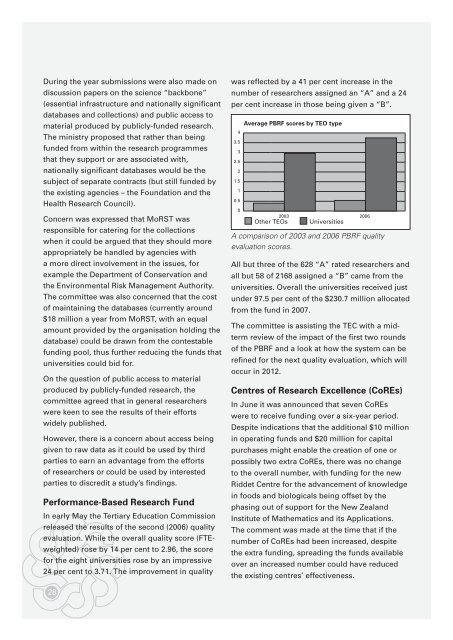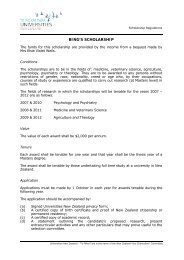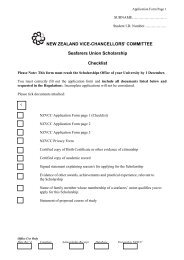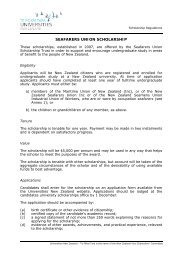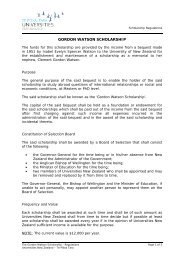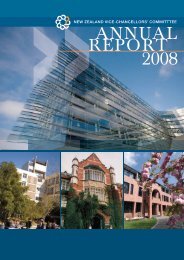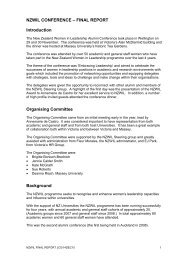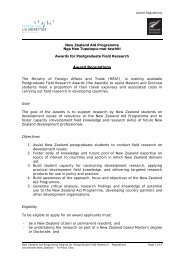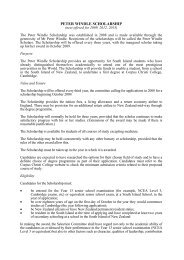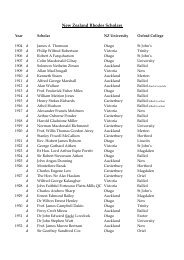New Zealand Vice-Chancellors' Committee - Universities New ...
New Zealand Vice-Chancellors' Committee - Universities New ...
New Zealand Vice-Chancellors' Committee - Universities New ...
You also want an ePaper? Increase the reach of your titles
YUMPU automatically turns print PDFs into web optimized ePapers that Google loves.
During the year submissions were also made on<br />
discussion papers on the science “backbone”<br />
(essential infrastructure and nationally significant<br />
databases and collections) and public access to<br />
material produced by publicly-funded research.<br />
The ministry proposed that rather than being<br />
funded from within the research programmes<br />
that they support or are associated with,<br />
nationally significant databases would be the<br />
subject of separate contracts (but still funded by<br />
the existing agencies – the Foundation and the<br />
Health Research Council).<br />
Concern was expressed that MoRST was<br />
responsible for catering for the collections<br />
when it could be argued that they should more<br />
appropriately be handled by agencies with<br />
a more direct involvement in the issues, for<br />
example the Department of Conservation and<br />
the Environmental Risk Management Authority.<br />
The committee was also concerned that the cost<br />
of maintaining the databases (currently around<br />
$18 million a year from MoRST, with an equal<br />
amount provided by the organisation holding the<br />
database) could be drawn from the contestable<br />
funding pool, thus further reducing the funds that<br />
universities could bid for.<br />
On the question of public access to material<br />
produced by publicly-funded research, the<br />
committee agreed that in general researchers<br />
were keen to see the results of their efforts<br />
widely published.<br />
However, there is a concern about access being<br />
given to raw data as it could be used by third<br />
parties to earn an advantage from the efforts<br />
of researchers or could be used by interested<br />
parties to discredit a study’s findings.<br />
Performance-Based Research Fund<br />
In early May the Tertiary Education Commission<br />
released the results of the second (2006) quality<br />
evaluation. While the overall quality score (FTEweighted)<br />
rose by 14 per cent to 2.96, the score<br />
for the eight universities rose by an impressive<br />
24 per cent to 3.71. The improvement in quality<br />
was reflected by a 41 per cent increase in the<br />
number of researchers assigned an “A” and a 24<br />
per cent increase in those being given a “B”.<br />
Average PBRF scores by TEO type<br />
4<br />
3.5<br />
3<br />
2.5<br />
2<br />
1.5<br />
1<br />
0.5<br />
0<br />
2003 2006<br />
Other TEOs <strong>Universities</strong><br />
A comparison of 2003 and 2006 PBRF quality<br />
evaluation scores.<br />
All but three of the 628 “A” rated researchers and<br />
all but 58 of 2168 assigned a “B” came from the<br />
universities. Overall the universities received just<br />
under 97.5 per cent of the $230.7 million allocated<br />
from the fund in 2007.<br />
The committee is assisting the TEC with a midterm<br />
review of the impact of the first two rounds<br />
of the PBRF and a look at how the system can be<br />
refined for the next quality evaluation, which will<br />
occur in 2012.<br />
Centres of Research Excellence (CoREs)<br />
In June it was announced that seven CoREs<br />
were to receive funding over a six-year period.<br />
Despite indications that the additional $10 million<br />
in operating funds and $20 million for capital<br />
purchases might enable the creation of one or<br />
possibly two extra CoREs, there was no change<br />
to the overall number, with funding for the new<br />
Riddet Centre for the advancement of knowledge<br />
in foods and biologicals being offset by the<br />
phasing out of support for the <strong>New</strong> <strong>Zealand</strong><br />
Institute of Mathematics and its Applications.<br />
The comment was made at the time that if the<br />
number of CoREs had been increased, despite<br />
the extra funding, spreading the funds available<br />
over an increased number could have reduced<br />
the existing centres’ effectiveness.<br />
28


